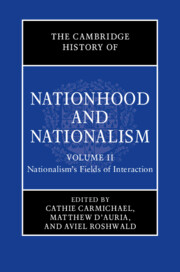Book contents
- The Cambridge History of Nationhood and Nationalism
- The Cambridge History of Nationhood and Nationalism
- The Cambridge History of Nationhood and Nationalism
- Copyright page
- Contents
- Figures
- Tables
- Contributors
- Part I Imperial and Postcolonial Settings
- Part II Transnational and Religious Missions and Identities
- Part III Intersections: National(ist) Synergies and Tensions with Other Social, Economic, Political, and Cultural Categories, Identities, and Practices
- 21 Self-Determination and National Sovereignty
- 22 Citizenship and Nationhood: From Antiquity to Gaia Citizenship
- 23 Religion and Nationhood
- 24 Nationalism and Capitalism
- 25 Economic Nationalism in an Imperial Age, 1846–1946
- 26 National Identity and the Idea of Race in the Dinaric Region
- 27 Nationalism, Ethnic Cleansing, and Genocide: A View from Below
- 28 Warfare, Nation Formation, and the Legitimacy of States: An Ethnosymbolic Perspective
- 29 Nationalism, Terrorism, and the State: Historical Perspectives
- 30 Negotiating National Identity through Tourism in Colonial South Asia and Beyond
- 31 Gendered Nations and Institutions
- 32 Historiographies and Commemorative Practices
- 33 Nation and Literature
- 34 Foodways and Nationhood
- 35 The Dynamics of National Music: Opera and Classical Music in the Nineteenth and Early Twentieth Century
- 36 Media and Nationalism: Europe and the USA, 1500–2000
- Conclusion to Part III
- Index
- References
35 - The Dynamics of National Music: Opera and Classical Music in the Nineteenth and Early Twentieth Century
from Part III - Intersections: National(ist) Synergies and Tensions with Other Social, Economic, Political, and Cultural Categories, Identities, and Practices
Published online by Cambridge University Press: 08 November 2023
- The Cambridge History of Nationhood and Nationalism
- The Cambridge History of Nationhood and Nationalism
- The Cambridge History of Nationhood and Nationalism
- Copyright page
- Contents
- Figures
- Tables
- Contributors
- Part I Imperial and Postcolonial Settings
- Part II Transnational and Religious Missions and Identities
- Part III Intersections: National(ist) Synergies and Tensions with Other Social, Economic, Political, and Cultural Categories, Identities, and Practices
- 21 Self-Determination and National Sovereignty
- 22 Citizenship and Nationhood: From Antiquity to Gaia Citizenship
- 23 Religion and Nationhood
- 24 Nationalism and Capitalism
- 25 Economic Nationalism in an Imperial Age, 1846–1946
- 26 National Identity and the Idea of Race in the Dinaric Region
- 27 Nationalism, Ethnic Cleansing, and Genocide: A View from Below
- 28 Warfare, Nation Formation, and the Legitimacy of States: An Ethnosymbolic Perspective
- 29 Nationalism, Terrorism, and the State: Historical Perspectives
- 30 Negotiating National Identity through Tourism in Colonial South Asia and Beyond
- 31 Gendered Nations and Institutions
- 32 Historiographies and Commemorative Practices
- 33 Nation and Literature
- 34 Foodways and Nationhood
- 35 The Dynamics of National Music: Opera and Classical Music in the Nineteenth and Early Twentieth Century
- 36 Media and Nationalism: Europe and the USA, 1500–2000
- Conclusion to Part III
- Index
- References
Summary
Lovers of opera and classical music will not find it hard to think of scores strongly associated with their authors’ national identity, such as Chopin’s mazurkas (c. 1825–1849), Wagner’s Die Meistersinger (1868), Smetana’s Vltava (The Moldau, 1874), or Sibelius’s Finlandia (1899). The connections between the traditions of art music and nationalism are manifold, and the nineteenth century, the age of musical Romanticism, in particular produced a substantial output of “national works,” the most successful of which are still in the repertory today. As a result, scholars of music have been debating the theme of “music and the nation” since the nineteenth century itself, when the discipline of music historiography first emerged.
- Type
- Chapter
- Information
- The Cambridge History of Nationhood and Nationalism , pp. 749 - 767Publisher: Cambridge University PressPrint publication year: 2023



